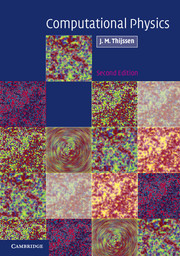Book contents
- Frontmatter
- Contents
- Preface to the first edition
- Preface to the second edition
- 1 Introduction
- 2 Quantum scattering with a spherically symmetric potential
- 3 The variational method for the Schrödinger equation
- 4 The Hartree–Fock method
- 5 Density functional theory
- 6 Solving the Schrödinger equation in periodic solids
- 7 Classical equilibrium statistical mechanics
- 8 Molecular dynamics simulations
- 9 Quantum molecular dynamics
- 10 The Monte Carlo method
- 11 Transfer matrix and diagonalisation of spin chains
- 12 Quantum Monte Carlo methods
- 13 The finite element method for partial differential equations
- 14 The lattice Boltzmann method for fluid dynamics
- 15 Computational methods for lattice field theories
- 16 High performance computing and parallelism
- Appendix A Numerical methods
- Appendix B Random number generators
- Index
Preface to the first edition
Published online by Cambridge University Press: 05 June 2012
- Frontmatter
- Contents
- Preface to the first edition
- Preface to the second edition
- 1 Introduction
- 2 Quantum scattering with a spherically symmetric potential
- 3 The variational method for the Schrödinger equation
- 4 The Hartree–Fock method
- 5 Density functional theory
- 6 Solving the Schrödinger equation in periodic solids
- 7 Classical equilibrium statistical mechanics
- 8 Molecular dynamics simulations
- 9 Quantum molecular dynamics
- 10 The Monte Carlo method
- 11 Transfer matrix and diagonalisation of spin chains
- 12 Quantum Monte Carlo methods
- 13 The finite element method for partial differential equations
- 14 The lattice Boltzmann method for fluid dynamics
- 15 Computational methods for lattice field theories
- 16 High performance computing and parallelism
- Appendix A Numerical methods
- Appendix B Random number generators
- Index
Summary
This is a book on computational methods used in theoretical physics research, with an emphasis on condensed matter applications.
Computational physics is concerned with performing computer calculations and simulations for solving physical problems. Although computer memory and processor performance have increased dramatically over the last two decades, most physical problems are too complicated to be solved without approximations to the physics, quite apart from the approximations inherent in any numerical method. Therefore, most calculations done in computational physics involve some degree of approximation. In this book, emphasis is on the derivation of algorithms and the implementation of these: it is a book which tells you how methods work, why they work, and what the approximations are. It does not contain extensive discussions on results obtained for large classes of different physical systems.
This book is not elementary: the reader should have a background in basic undergraduate physics and in computing. Some background in numerical analysis is also helpful. On the other hand, the topics discussed are not treated in a comprehensive way; rather, this book hopefully bridges the gap between more elementary texts by Koonin, Gould and Giordano, and specialised monographs and review papers on the applications described. The fact that a wide range of topics is included has the advantage that the many similarities in the methods used in seemingly very different fields could be highlighted. Many important topics and applications are however not considered in this book – the material presented obviously reflects my own expertise and interest.
Information
- Type
- Chapter
- Information
- Computational Physics , pp. xi - xiiiPublisher: Cambridge University PressPrint publication year: 2007
